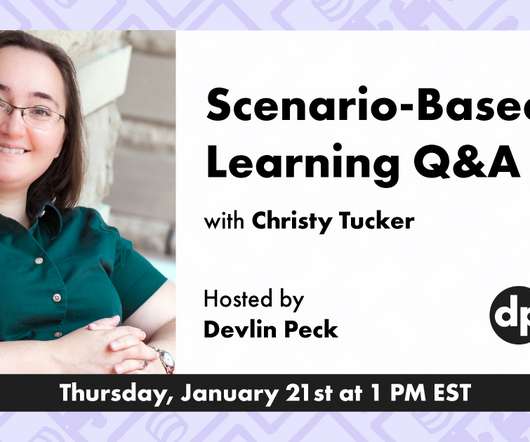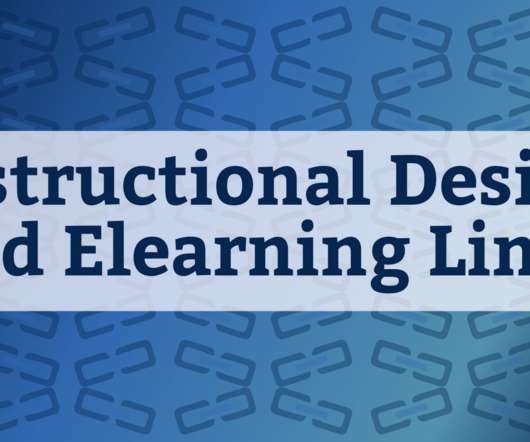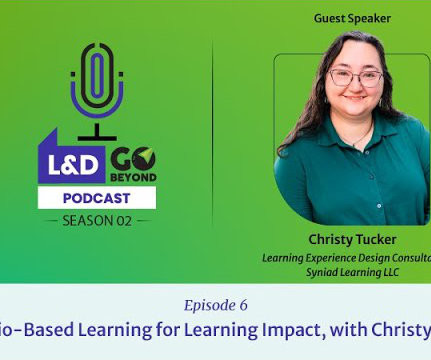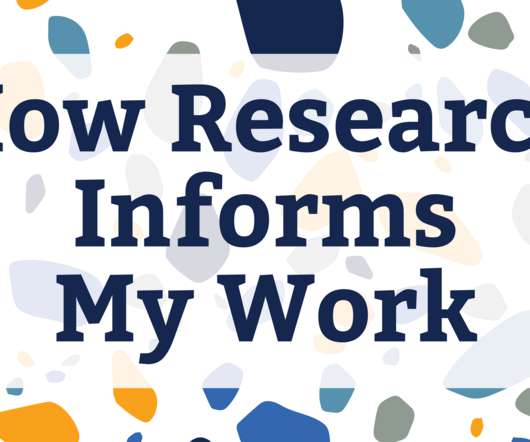Learning and Cognitive Load
B Online Learning
FEBRUARY 25, 2015
In a previous post, I looked at the fundamentals of cognitive load theory.
This site uses cookies to improve your experience. To help us insure we adhere to various privacy regulations, please select your country/region of residence. If you do not select a country, we will assume you are from the United States. Select your Cookie Settings or view our Privacy Policy and Terms of Use.
Cookies and similar technologies are used on this website for proper function of the website, for tracking performance analytics and for marketing purposes. We and some of our third-party providers may use cookie data for various purposes. Please review the cookie settings below and choose your preference.
Used for the proper function of the website
Used for monitoring website traffic and interactions
Cookies and similar technologies are used on this website for proper function of the website, for tracking performance analytics and for marketing purposes. We and some of our third-party providers may use cookie data for various purposes. Please review the cookie settings below and choose your preference.

B Online Learning
FEBRUARY 25, 2015
In a previous post, I looked at the fundamentals of cognitive load theory.

Experiencing eLearning
DECEMBER 17, 2019
In elearning, we often focus on clicks and interaction. However, we can also support the cognitive and affective dimensions of engagement. Different researchers have identified different behaviors as showing engagement, but this one seems relevant for workplace elearning. Cognitive engagement. Behavioral engagement.
This site is protected by reCAPTCHA and the Google Privacy Policy and Terms of Service apply.

Thinkdom
NOVEMBER 6, 2023
This means that when we are exposed to too much information, we experience cognitive overload, which hinders our learning and retention. This is what cognitive overload feels like. Your employees may face this in their eLearning courses, if they are exposed to an excess of information without proper structuring or pacing.

B Online Learning
AUGUST 12, 2014
When I first started working as an eLearninginstructional designer I became interested in the learning process and how people learn. I came across a book called Efficiency in Learning: Evidence-Based Guidelines to Manage Cognitive Loadby Ruth […].

Advertisement
Cognitive science theories already supply the answers. Learner engagement and retention doesn’t have to be a mystery. Learn how OttoLearn packages them into a single platform you can use to deliver microlearning based reinforcement training, and go beyond completions to focus on outcomes.

Infopro Learning
MAY 19, 2022
The data collected through market analysis will allow you to document detailed strategies for e-learning development. Ensure the strategies align with your business plan and the custom e-learning development process. There are various aspects to consider when analyzing the market situation, including : Key activities. Key partner.

Web Courseworks
OCTOBER 24, 2014
For some instructional designers the accessibility standards of Section 508 of the Rehabilitation Act can become a source of confusion, frustration, and anxiety during eLearning course design. In some situations you may be able to prioritize accessibility demands to meet the needs of the intended audience.

The Learning Rooms
APRIL 23, 2025
We are launching an evidence-based Building Resilience eLearning course to help people thrive in challenging times. They help organisations develop eLearning, blended learning and tutor-led training solutions that engage learners and deliver results.

IT Training Department Blog
JULY 10, 2023
If any content in an eLearning course doesn’t directly help one of those three things then you’re doing it wrong. Whether you’re in the instructional design world and are familiar with cognitive load theory or on the content side of things, content overload has the same negative impact on workplace learning.

eLearningMind
JANUARY 15, 2021
In the corporate world, LxDs, or Learning Experience Designers, are the rock stars in the eLearning space. . What does this mean in the corporate eLearning space? You may have noticed that most job boards for eLearning companies list positions for Learning Experience Designers, rather than once-common Instructional Designers.

eLearningMind
OCTOBER 1, 2021
In the corporate world, LxDs, or Learning Experience Designers, are the rock stars in the eLearning space. What does this mean in the corporate eLearning space? You may have noticed that most job boards for eLearning companies list positions for Learning Experience Designers, rather than once-common Instructional Designers.

Experiencing eLearning
JULY 9, 2019
Neuroscience research is used to explain results from cognitive psychology research. They also try to connect cognitive research on the other side with classroom experience. Patterns, Examples, and Tips for eLearning Scenarios. First, you choose which strategy to use. tags: branching. tags: scenarios e-learning.

Experiencing eLearning
JANUARY 16, 2024
What is Cognitive Task Analysis? – Global Cognition Understanding how experts approach problems and make decisions is challenging, but important for training people on complex skills. Cognitive Task Analysis isn’t one approach to analysis, but rather a number of related methods to uncover information from SMEs.

Experiencing eLearning
FEBRUARY 9, 2021
What’s your strategy for gathering content for scenarios from SMEs and stakeholders? How do you know if you have too many branches, and risk cognitive overload for the learner? The post Scenario-Based Learning Q&A with Devlin Peck appeared first on Experiencing eLearning. Working with SMEs and stakeholders.

Upside Learning
MARCH 5, 2025
Though eLearning has been well accepted as a tool for technical training and compliance, its true potential lies untapped. Instead of relying solely on formal training sessions, companies must integrate AI-driven eLearning platforms that push real-time, microlearning updates.

eLearning Industry
MAY 19, 2022
Understanding cognitive biases is a critical skill for the workforce because it can facilitate better decision-making. This article discusses cognitive biases and remedies. This post was first published on eLearning Industry.

Experiencing eLearning
MARCH 8, 2022
This post includes links on insights for L&D, Twine, game design, graphic design, and quality assurance for elearning. Two Questions That Should Be Influencing Every L&D Team’s Strategy. eLearning Quality Assurance Checklist : Publications Library | The Learning Guild. Insights for L&D professionals.

Brilliant Teams
AUGUST 27, 2024
In today’s digital world, eLearning has become a critical component of business training and education. Accessibility in eLearning isn’t just about compliance with laws or guidelines—it’s about creating an inclusive educational experience that benefits all learners. Are you looking for eLearning Solutions?

Ninja Tropic
APRIL 2, 2025
Before developing eLearning, define what you want to achieve. Implementing risk management strategies might involve conducting a thorough analysis of potential risks in a project timeline to proactively address any challenges that could arise. Employees learn at their own pace, mastering one competency before moving on to the next.

Clarity Consultants
SEPTEMBER 21, 2023
As companies increasingly turn to eLearning platforms to facilitate employee training and development, it’s crucial to understand the cognitive processes at play. Let’s look into the fascinating world of Cognitive Load Theory and explore how it impacts learning from a corporate perspective.

Experiencing eLearning
SEPTEMBER 28, 2021
This post includes links on scenario-based learning (SBL) research, working with Twine, learning experience design (LXD), 360 images, VR resources, and elearning development time calculators. This issue summarizes a study comparing in-class scenario-based learning to scenario-based elearning. eLearning development calculators.

eLearning Company
MARCH 26, 2023
Introduction to Cognitive Load Theory Cognitive Load Theory (CLT) is a psychological framework that helps us understand the mental processes involved in learning new information. It offers important insights into how learners acquire, process, and store information, as well as how they use it to solve problems and make decisions.

eLearning Industry
MARCH 26, 2024
This article shares 5 strategies for reducing cognitive load in eLearning and streamlining the collaboration between Instructional Designers and SMEs. This post was first published on eLearning Industry.

Experiencing eLearning
APRIL 2, 2024
Compelling Narratives: Delve into the significance of storytelling within scenarios, emphasizing the inclusion of characters, conflict, and consequences to evoke cognitive and emotional engagement. Navigating Pitfalls: Gain insights into common pitfalls to avoid in scenario-based learning design and strategies for mitigating these challenges.

eLearning Industry
DECEMBER 18, 2023
This article explores the role of scaffolding as a pedagogical strategy to lighten the cognitive load on learners, fostering a more efficient and enjoyable learning journey. This post was first published on eLearning Industry.

Capytech
OCTOBER 7, 2021
10 Tips to Prevent Cognitive Overload in E-Learning. In a previous blog, we explained cognitive load theory and looked at ways to identify if cognitive overload is a problem in your existing e-learning courses. Preventing Cognitive Overload from Occurring When Designing New E-Learning Courses. Focus on the Topic.

Instancy
APRIL 27, 2025
Text-heavy storyboards are a common challenge in eLearning development. Subject matter experts (SMEs) often provide comprehensive content, but simply displaying pages of text on the screen leads to cognitive overload, low engagement, and poor retention. Expert Strategies for Transforming Dense Content 1.

Learnnovators
FEBRUARY 7, 2025
It also involves designing content with clear language, readable fonts, and color-contrast settings to improve accessibility for those with cognitive differences. By embracing the diversity of your teams and implementing these strategies, you build a workplace culture that encourages collaboration, innovation, and growth for everyone.

Experiencing eLearning
FEBRUARY 4, 2020
This is one of the sessions in the eLearning Guild’s Making Learning Stick Online Conference. Elearning can also be shallow and too focused on remembering content, without opportunities to practice new skills. Using scenarios can make your elearning more engaging and relevant. I’ll post about this later.

Experiencing eLearning
JULY 2, 2024
Check out the tips on prompting strategies and notes on limitations of LLMs. Make ChatGPT 10x better | Notion I’m not sure this will make ChatGPT 10x better, but this is a good summary of the prompt strategies in OpenAI’s guide to prompting. Freelancing Need a client?

The Learning Rooms
APRIL 11, 2025
Welcome to the A-Z of Digital Learning, your comprehensive glossary of learning and eLearning terminology. Alternative text describing the content of an image on a website or in an eLearning course. Equipment, software, or a device which enables learners with disabilities to access eLearning and other content. C Cognitive Load.

Experiencing eLearning
FEBRUARY 15, 2022
In addition to writing, you can use research to inform your elearning development. If people don’t need to spend much cognitive effort figuring out HOW to access and navigate training, they can expend more effort toward actual learning. The post How Research Informs My Work appeared first on Experiencing eLearning.

Clark Quinn
AUGUST 11, 2020
Performance support: cognitive augmentation. Further, since mobile is a platform – a strategy not just a tactic – focusing on fundamentals makes sense. For instance, elearning shouldn’t look like just a classroom online. Then I moved on to the role the devices play in our (working) life. Of course, I now would.

Infopro Learning
APRIL 10, 2018
Do you need to refresh your eLearning course without going over budget? In this article, I’ll share 8 creative tips to reuse eLearning content with a rapid eLearning authoring tool. How To Reuse eLearning Content With A Rapid eLearning Authoring Tool. Turn Online Training Tutorials Into Interactive Demos.

Experiencing eLearning
DECEMBER 15, 2020
Ruth Clark’s book Scenario-Based e-Learning: Evidence Based Guidelines for Online Workforce Learning explains how scenario-based elearning helps people learn new skills faster. Chapter 10 of Clark’s book asks, “Does scenario-based elearning work?” Scenario-based elearning can offer return on investment.

Experiencing eLearning
MARCH 22, 2022
Session 602 Set the Stage: Make eLearning Relevant and Authentic with Scenarios. In this session, you’ll learn how to create relevant and authentic scenarios to enhance your eLearning and improve performance. You’ll leave this session with an approach to weaving different aspects of scenarios together to bring your eLearning to life.

Experiencing eLearning
AUGUST 13, 2019
Engagement can be cognitive, behavioral, or emotional. Book — The Learning Scientists Quick summaries of key points from each chapter in a book on learning science and effective strategies (spacing, elaboration, concrete examples, visuals, and retrieval practice). Research: Learning Science, Growth Mindset, and Taking Notes.

Origin Learning
DECEMBER 23, 2014
At the heart of it lies a thorough understanding of the employees who are going to take up this eLearning course. Since we are talking about eLearning here, the way you approach your audience will be directly based on their level of comfort with operating technological devices like PCs, smartphones and tablets.

eLearning Industry
DECEMBER 7, 2020
Videos are a great tool to use in eLearning. Not only do they help in cognitive load reduction, but they grab viewer attention and add to learner engagement. In this article, I show you how you can leverage eLearning videos to train digital learners. This post was first published on eLearning Industry.

Clark Quinn
AUGUST 12, 2020
I received, in my email, a solicitation for a webinar titled 5 Tips to Engage Gen Z and Millennial eLearners in 2020 and Beyond. Their cognitive architecture isn’t fundamentally different; evolution doesn’t work that fast. And, as you might imagine, it tweaked my sensibilities for the worse. ” What?

eLearning Industry
NOVEMBER 3, 2023
Schema theory, proposed by Jean Piaget in 1952, is a fundamental concept in the field of cognitive psychology that focuses on how individuals organize and process information. Piaget's theory explains how people develop cognitive structures, or "schemas," to make sense of their experiences.

Upside Learning
MARCH 24, 2025
In actuality, a standard eLearning course typically fails, even if it can seem like the obvious choice. So, what happens when you implement a one-size-fits-all eLearning program? Think of it this way: Traditional eLearning is like forcing everyone to eat the same buffet meal, even if theyre allergic to some dishes.

eLearning Industry
SEPTEMBER 13, 2023
This article explores six key strategies for entrepreneurial success, each backed by psychological reasoning. From calculated risk-taking driven by the psychology of courage to the importance of cognitive flexibility in adaptive learning, we dive deep into the mindsets that drive business triumphs.

eLearning Industry
FEBRUARY 9, 2025
Discover how cognitive learning strategies can help you acquire new skills and knowledge more effectively. This post was first published on eLearning Industry. Enhance your learning journey with practical tips and insights.
Expert insights. Personalized for you.
Are you sure you want to cancel your subscriptions?


Let's personalize your content